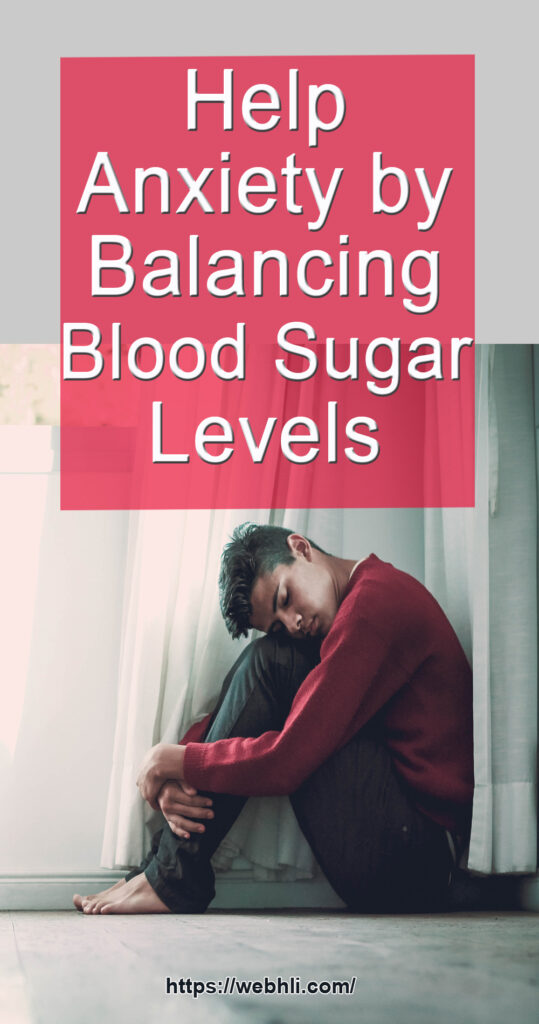
One of the often overlooked causes of anxiety, panic attacks, and mood problems is imbalanced blood sugar. Some people may see it as diabetes (hyperglycemia - high blood sugar), hypoglycemia (low blood sugar), and/or insulin resistance. As sugar levels swing high and low, the body blasts out adrenaline (epinephrine) and cortisol to balance blood sugar levels so the brain doesn't starve of glucose. How can balancing blood sugar help anxiety?
Check out these related articles, too:
The Importance of the Blood Sugar Chart
Blood Sugar Level Chart What's Normal and What's Not
Blood Sugar Levels High What You Should Do Next
Using a Diabetic Blood Sugar Level Chart How to Know If You're in a Normal Range
How to Get Your Blood Sugar Back to Normal
A Blood Sugar Reducing Diet Can Save Your Life
Reducing Complications With a Good Diabetic Diet Plan
By balancing sugars levels, adrenal hormones adrenalin and cortisol levels aren't all over the map. This also allows the adrenals to rest as well as lessen anxiety because high levels of adrenaline circulating around. Panic attacks and anxiety is very common especially when blood glucose (sugar) levels are low since it's the adrenaline and cortisol that raise levels to safe levels.
Most of the panic attacks and anxious feelings I experienced were due to hypoglycemic (low blood sugar) episodes. It only took six long months to figure this out! When I hit 39 (very low number!) during my 6 hour glucose tolerance test my doc said "Yep, you have SEVERE hypoglycemia!". Eating correctly to balance blood sugar levels and taking supplements to fill nutritional voids was how I stopped the relentless 24/7 panic and anxiety.
Because I get asked so often, I'm going to share how I eat for blood sugar balance. Everybody is different, so each individual will have to experiment to see what works for them. I also use a glucose meter to check my levels first thing in the morning, before and after a meal, in-between meals, and before bed. My system may seem simple, but it works for me.
Jen Crippen's Blood Sugar Balancing Strategy:
- BREAKFAST: It is important to eat something within a 1/2 hour of waking. If not, the body runs on adrenalin to keep blood sugar levels up until a meal is consumed. This is very taxing on the adrenals. I eat a high fat/protein meal with a tiny bit of low glycemic carbs to get me going. For example: apple (CARB) with raw almond butter (FAT & PROTEIN; eggs (FAT & PROTEIN) with carrots (CARB), tomato (CARB); low glycemic protein smoothie (CARB & PROTEIN) with added coconut oil (FAT) and raw egg (FAT & PROTEIN)
- MID-MORNING SNACK: Something light and protein rich like a handful of almonds (FAT & PROTEIN) with Ningxia Wolfberries (CARB) or 1 hard boiled egg
- LUNCH: Nice substantial meal with veggies, protein, and substantial fat. For example: tuna salad (PROTEIN) with celery, tomato (CARB), natural food mayo (FAT); spring green salad with 2 hard boiled eggs (FAT & PROTEIN), green peppers, scallions, carrot (CARB), sunflower seeds (FAT & PROTEIN), oil & vinegar dressing, couple of Ningxia Wolfberries (CARB); hamburger (PROTEIN) with small spring green salad
- AFTERNOON SNACK: Again, something light and protein rich.
- DINNER: Dinner I always have a heavy protein (seafood, meat, poultry) along with green vegetables (spinach, broccoli, chard, green beans) and a starchy vegetable for carbohydrates (root vegetables, sweet potato, squash). Very rarely will I eat any grains, but when I do it's quinoa, black rice, or teff.
- AN HOUR BEFORE BEDTIME SNACK: This snack is very important because often my blood sugar levels would plummet overnight and give me restless sleep or nightmares. Sometimes I will have a bit of the leftovers from dinner in a very small portion or even a smoothie. I keep it very light and total volume of food is normally about a 1/2 to 3/4 cup.
As for drink, I typically have water or non-caffeinated tea (herbal). I don't drink soda of any kind and rarely drink alcohol. Alcohol creates a sugar swinging nightmare! Also, anything with caffeine creates blood sugar havoc because of the adrenaline surge. So it's best to avoid with blood sugar, anxiety, panic, and/or adrenal issues.
There is a lot more to my strategy on how to eat to help anxiety. There are many secrets such as portion size of carbs to protein and fat, getting off soda, and how to enjoy sweets without the blood sugar and anxiety consequence!
Jennifer Springer - Crippen has personally overcome anxiety, hypoglycemia, and adrenal fatigue that paralyzed her life for over a year and a half. To learn about the surprising root causes of anxiety and how she recovered using a natural approach, visit her blog at http://www.NaturalAnxietyTherapy.com. Would you like to know 5 Things to Reduce Anxiety Right Now? Get it now by visiting http://NaturalAnxietyTherapy.com/5-things/.
Article Source: http://EzineArticles.com/3859728

 Protected by Patchstack
Protected by Patchstack